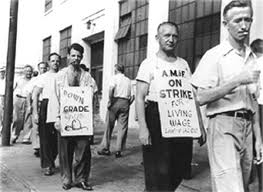Date in History : March 23, 1932
The Norris-LaGuardia Act, passed in 1932, during the last year of
the Hoover Administration, was the first in a series of laws passed by
Congress in the 1930s which gave Federal sanction to the right of
labor unions to organize and strike, and to use other forms of
economic leverage in dealings with management.
The law specifically prohibited Federal courts from enforcing
so-called “yellow dog” contracts or agreements (under which workers
promised not to join a union or promised to discontinue membership in
one).
In addition, it barred Federal courts from issuing restraining orders
or injunctions against activities by labor unions and individuals,
including the following:
(*) joining or organizing a union, or assembling for union purposes;
(*) striking or refusing to work, or advising others to strike or
organize;
(*) Publicizing acts of a Labor dispute; and
(*) providing lawful legal aid to persons participating in a labor
dispute

